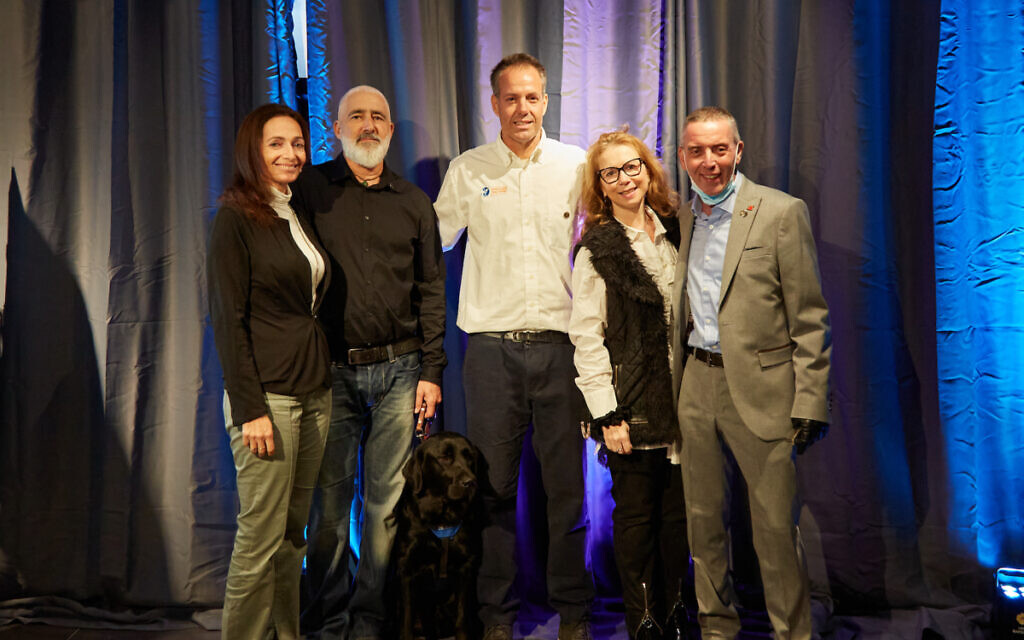The dog saving an Israeli soldier
The Israel Guide Dog Centre expanded its work to help PTSD sufferers like Benzi who is being helped by Lugo

“When he saw me and I saw him, it was boom. Instant.” Like all the best love stories, the moment Benzi met Lugo was a game changer. For Lugo, the handsome two-and-a-half -year-old black Labrador, it meant developing a new relationship with a permanent master, while for Benzi the Israeli soldier there was a chance to get his life back. Or a semblance of it, as the life he once loved had disappeared entirely, until Lugo arrived eight months ago, bringing a slither of light to the perpetual darkness of Benzi’s post-traumatic stress disorder.
Arriving at The Engine Rooms for their London guest appearance at the Israel Guide Dog’s annual reception, neither Benzi nor Lugo appeared fazed by the 70-plus crowd eager to meet them. Some of the charity’s supporters even got Benzi’s consent to stroke Lugo, which was a privilege, as they are more cautious when greeting the dogs of blind and visually impaired guests who have previously visited from Israel.

Martin Segal, executive director of the charity’s UK arm, has always made a concerted effort to bring owners and their dogs to this country, so that donors can hear their emotive stories and see the impact of their philanthropy first-hand. When Covid travel bans stopped those visits for almost two years, Martin continued with his fundraising undeterred, knowing that the restrictions imposed on the Centre had made training more difficult. He also knew that the first post-Covid in-person event would have to be stirring, and that’s what he achieved with the first ever visit by a PTSD Service dog partnership that is a big success.
Get The Jewish News Daily Edition by email and never miss our top stories Free Sign Up
Providing dogs for Israel’s 24,000 blind and visually impaired citizens has been the centre’s mission since operations began 30 years ago, but expanding to meet the needs of those with other disabilities, including children with autism, is recent, as is providing dogs for soldiers with PTSD. Soldiers like Benzi, who are so traumatised by their military experience that they can no longer cope with living.

To look at Benzi relaxed and politely shaking hands, with the shiny-coated Lugo by his side, all seems right in his world. But across the room, Irit, Benzi’s wife, is watching his every move. She has learnt to read her husband and can see when he is struggling or needs to make a quick exit to compose himself. In the past few years, Irit has seen her husband so taken over by depression that he was unable to leave the house. Rejecting hugs from their children or abstaining from any human touch at all is who Benzi is now, and Irit also read the goodbye note he left on the table before intending to kill himself.
Yariv Melamed has learnt to work with men who share Benzi’s mental health struggles by helping them in his role as head of service dog training at the centre. The task of creating the right partnerships between one man or woman and a dog is his responsibility, and his sensitivity is evident at the meeting as he follows the unspoken code of communication between Benzi and Lugo. “Lugo was donated to us from an American school, and like all our dogs was first given guidance training,” explains Yariv. “But after two months, we changed his career as we felt he was more suitable for PTSD.”
Yariv lowers his voice while discussing Lugo’s role switch. “We don’t want him to hear,” says the respected trainer sweetly, though there’s no shame on Lugo’s part. “All the dogs pass the initial tests, but during the five-month period we observe them. We can tell if a dog is right to guide and be a person’s eyes or is more suited to PTSD and giving emotional support, which is a much more tangible gift.”

To date, the ICDC has given dogs to 25 soldiers with varying degrees of PTSD on the recommendation of the Ministry of Defence, who also helped Benzi, despite his reluctance to have a dog for fear of being stigmatised. He is tentatively over that, but the dogs with the acronym emblazoned on their jackets are unfamiliar to Israelis, so aren’t yet as respected as guide dogs.
“If I try to go in a restaurant with Lugo I get refused. Or in a taxi, they say the dog is not allowed,” says Benzi. “After they check they say it’s ok, but they don’t know about service dogs. I was also asked in a London restaurant if Lugo was a guide dog , but told them he was a service dog and it wasn’t a problem. When there are more PTSD dogs in Israel people will see them and understand.”
Understanding Benzi, 51, is difficult for his family and closest friends. Only four years ago he was the spouse Irit described as her “superman”, travelling the world, coaching sports, enjoying a job in security. “Leading a normal life,” says Benzi, recalling that time before an innocent visit to the cinema changed everything.
Benzi had gone to see Clint Eastwood’s critically acclaimed Iraq war movie American Sniper, starring Bradley Cooper, not realising that it would trigger a moment in his IDF past that he had buried. It was a single scene in which Cooper grapples with killing a child who poses a threat to his comrades that took Benzi back to his time in Gaza during the Second Intifada.“It made me remember everything I did. But Cooper didn’t shoot the boy. I did.”
Asking Benzi the details of his PTSD during his visit was not advised, but the former soldier wanted to share. “From that movie I started toppling down. I closed myself in my room, stayed in bed and didn’t want to see anybody who came to the house. I saw no one. All I did was just drink and smoke. “It was hard and is still very hard on our children. They have slowly started to understand, but they don’t know the main stuff that is happening inside their father. They know to stay back when I’m angry and don’t want anyone to touch me. But will also come if I need a hug. That’s hard for them, and for me as their father.”

As Benzi talks, Irit listens, her pain visible as the words underline their continuing anguish. Benzi’s suicide attempt took him to a psychiatric unit where his PTSD was diagnosed, but until Lugo there was no real hope of help. “Before Lugo, I never went out of the house,” says Benzi. “Now I have to get up to take him out. And on the street, people see him, and the first thing they do is laugh.When somebody is laughing that’s good for me.” Though Lugo’s sombre dignity and expressive eyes are more suggestive of trust and empathy than chuckles, the reaction Benzi gets is what he needs. He is still plagued by the darkest of thoughts and doesn’t believe they will ever leave him.
“At dinner, in the shower, when I go to sleep. It’s everywhere. But before Lugo it was in my head 100 percent, and now it’s 60 percent So it’s helping.” Benzi’s former life may be out of reach, but with his hand on Lugo it’s closer.
https://israelguidedog.org.uk/

Thank you for helping to make Jewish News the leading source of news and opinion for the UK Jewish community. Today we're asking for your invaluable help to continue putting our community first in everything we do.
For as little as £5 a month you can help sustain the vital work we do in celebrating and standing up for Jewish life in Britain.
Jewish News holds our community together and keeps us connected. Like a synagogue, it’s where people turn to feel part of something bigger. It also proudly shows the rest of Britain the vibrancy and rich culture of modern Jewish life.
You can make a quick and easy one-off or monthly contribution of £5, £10, £20 or any other sum you’re comfortable with.
100% of your donation will help us continue celebrating our community, in all its dynamic diversity...
Engaging
Being a community platform means so much more than producing a newspaper and website. One of our proudest roles is media partnering with our invaluable charities to amplify the outstanding work they do to help us all.
Celebrating
There’s no shortage of oys in the world but Jewish News takes every opportunity to celebrate the joys too, through projects like Night of Heroes, 40 Under 40 and other compelling countdowns that make the community kvell with pride.
Pioneering
In the first collaboration between media outlets from different faiths, Jewish News worked with British Muslim TV and Church Times to produce a list of young activists leading the way on interfaith understanding.
Campaigning
Royal Mail issued a stamp honouring Holocaust hero Sir Nicholas Winton after a Jewish News campaign attracted more than 100,000 backers. Jewish Newsalso produces special editions of the paper highlighting pressing issues including mental health and Holocaust remembrance.
Easy access
In an age when news is readily accessible, Jewish News provides high-quality content free online and offline, removing any financial barriers to connecting people.
Voice of our community to wider society
The Jewish News team regularly appears on TV, radio and on the pages of the national press to comment on stories about the Jewish community. Easy access to the paper on the streets of London also means Jewish News provides an invaluable window into the community for the country at large.
We hope you agree all this is worth preserving.
-
By Brigit Grant
-
By Laurent Vaughan - Senior Associate (Bishop & Sewell Solicitors)
-
By Laurent Vaughan - Senior Associate (Bishop & Sewell Solicitors)
-
By Laurent Vaughan - Senior Associate (Bishop & Sewell Solicitors)
-
By Laurent Vaughan - Senior Associate (Bishop & Sewell Solicitors)





















